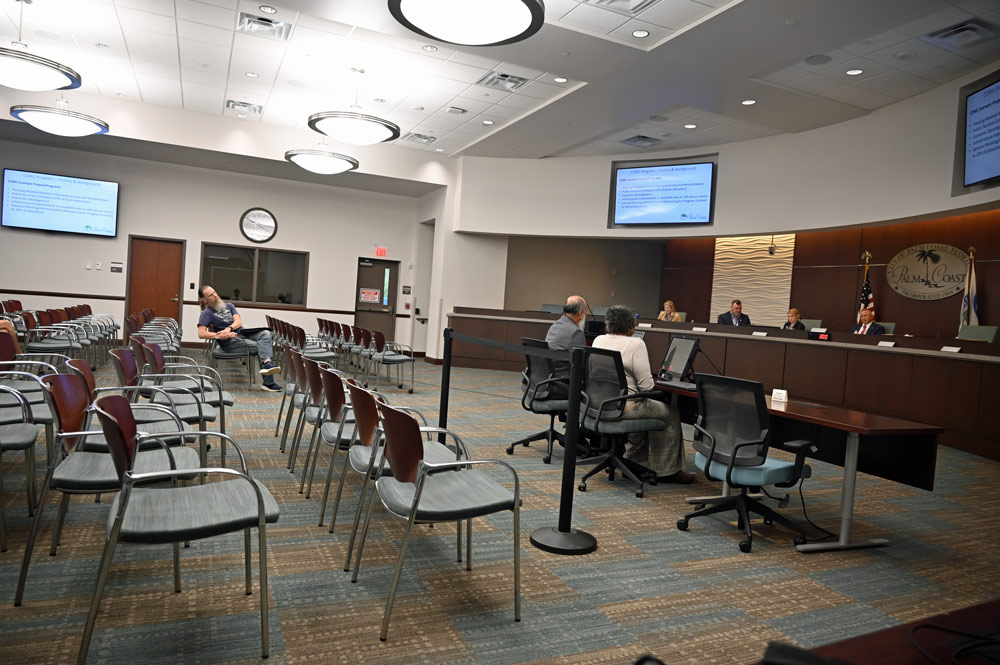
The shiniest-new Palm Coast City Council since the city’s founding took a page out of the long Jon Netts era as it voted to restore a second monthly workshop to go along with the two monthly meetings it’s held nearly since the city’s creation in 1999. It’ll need it: the council, with just one member barely exceeding two years’ service and everyone else a rookie or close to it, collectively is the least experienced in the city’s history, though its meetings since November have been efficient and productive, and surprisingly less mercurial than its predecessor.
The decision Tuesday is part of a relatively modest rewriting of council procedures prompted less by its experience (or the lack of it) than by its members’ wish to be more accessible and engaging with the public, and in one case, in a change in law.
As during the Netts years–he was the city’s longest serving council member and mayor–the council will alternate between workshops and “business meetings,” where it votes on items previously workshopped. That second workshop had been eliminated during the years of Milissa Holland’s mayorship. That resulted in progressively heavier workshop agendas and longer business meetings. when workshopped items hadn’t been fully vetted. The one difference with the Netts era will be that, when the new schedule begins in February, one of the two workshops will be scheduled at 6 p.m. Previously, all workshops were scheduled at 9 a.m.
“The whole point of the matter was to try to get more participation, more time for people to come up for night meetings,” Mayor Mike Norris said. “We compromised on it a little.”
Norris had originally favored holding most or all meetings and workshops in the evening, as had Council member Ray Stevens. But as other council members noted, that would have created the same imbalance as having all-morning meetings, excluding those who prefer not to be out in the evening, or, in a workforce given to non-traditional shifts, schedules and families, who have work and personal schedules that prevent them from attending evening meetings. The city’s broadcast of its meetings on YouTube also allows for easy, live-streamed access and replays at anyone’s leisure–with a beer in hand if citizens wish, making the experience more endurable.
Either way, the change is not likely to have the desired effect: local government meeting attendance is not driven by meeting schedules, but by meeting agendas and residents’ interest in–or indifference to–particular topics. Bunnell and Flagler Beach have long held almost all but their budget meetings in the evenings, including the meetings held by their advisory boards. Attendance remains very light unless a controversial topic is on the agenda.
Among the changes to council procedures is the deletion of a provision that authorized the mayor to “call to order any member of the City Council who violates any of these procedures” and gives the mayor the authority to “decide questions of order, subject to a majority vote on a motion to appeal.” It is a sharp diminution of the mayor’s authority in chairing meetings, at least when managing what, over the last few years, had been an occasionally unruly few (though the most unruly of them is no longer on the council.)
The authority to call out an unruly council member is still there, but that role–the role of a parliamentarian–has now shifted to the city attorney. The role requires a degree of stature that the city’s previous attorney, Bill Reischmann, had honed over several years but that the current attorney, Marcus Duffy, is still learning.
The council also agreed to hold award presentations before the business part of an evening meeting begins–so at 5:30 p.m.–while limiting public participation segments to 30 minutes. The two public participation periods at the beginning and end of each meeting will remain. The new rules recognize a recent decision by the federal 11th Circuit Court of Appeals that has made it illegal to require the public to address all comments only to the meeting chair. The public may address comments to the mayor or to individual council members, even by name, or to do so collectively.
Notably, the new rules require any contract or agreement involving $1 million or more to be its own agenda item. It may not be included in the consent portion of the agenda–the portion that includes numerous routine items and that gets voted on as a group. On occasion, items of requiring a more public airing slip in there.
The procedures now allow for special meetings called either by the mayor or a “majority of the members of City Council,” though the amendment allows for that majority to make that call outside of a council meeting, which would be a violation of the state’s open meeting law.
The council had discussed having a sign-language interpreter at each meeting–not workshops. The cost would be affected by evening meetings, when the $100-an-hour per interpreter cost goes up. There would have to be two interpreters present, in case a meeting runs longer than two hours, but any assignment of an interpreter at a meeting would have to be billed at a two-hour minimum. “So for the number of hours City Council met in 2024 it would be approximately $30,000 for an interpreter to be present at every city council meeting,” Virginia Smith, the city’s land management administrator and former city clerk, told the council.
![]()





























Leave a Reply